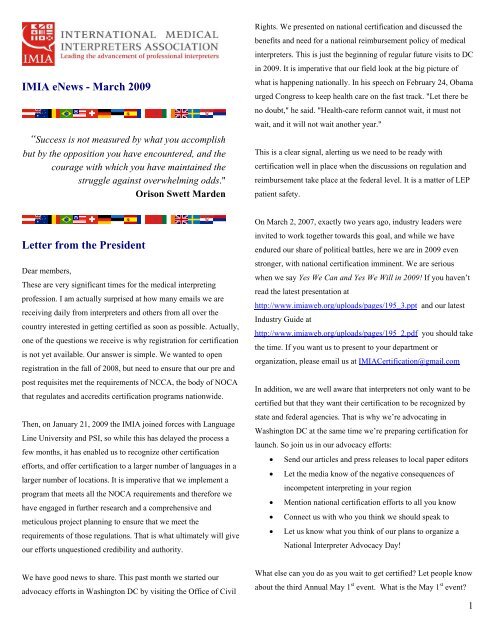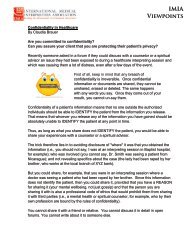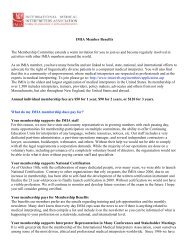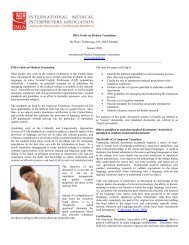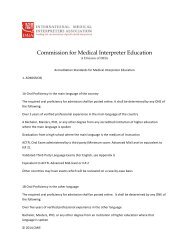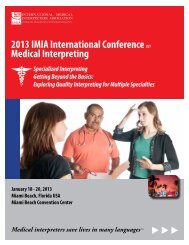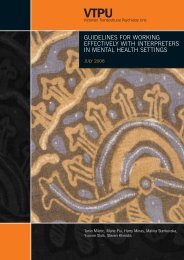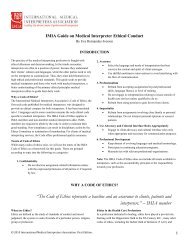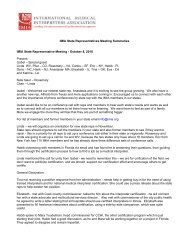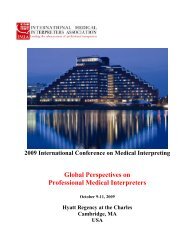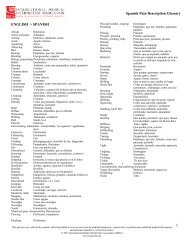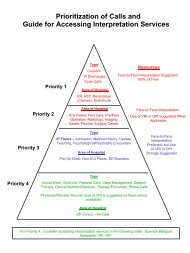IMIA eNews - March 2009 Letter from the President - International ...
IMIA eNews - March 2009 Letter from the President - International ...
IMIA eNews - March 2009 Letter from the President - International ...
Create successful ePaper yourself
Turn your PDF publications into a flip-book with our unique Google optimized e-Paper software.
Rights. We presented on national certification and discussed <strong>the</strong><br />
benefits and need for a national reimbursement policy of medical<br />
interpreters. This is just <strong>the</strong> beginning of regular future visits to DC<br />
in <strong>2009</strong>. It is imperative that our field look at <strong>the</strong> big picture of<br />
<strong>IMIA</strong> <strong>eNews</strong> - <strong>March</strong> <strong>2009</strong><br />
“Success is not measured by what you accomplish<br />
but by <strong>the</strong> opposition you have encountered, and <strong>the</strong><br />
courage with which you have maintained <strong>the</strong><br />
struggle against overwhelming odds."<br />
Orison Swett Marden<br />
what is happening nationally. In his speech on February 24, Obama<br />
urged Congress to keep health care on <strong>the</strong> fast track. "Let <strong>the</strong>re be<br />
no doubt," he said. "Health-care reform cannot wait, it must not<br />
wait, and it will not wait ano<strong>the</strong>r year."<br />
This is a clear signal, alerting us we need to be ready with<br />
certification well in place when <strong>the</strong> discussions on regulation and<br />
reimbursement take place at <strong>the</strong> federal level. It is a matter of LEP<br />
patient safety.<br />
On <strong>March</strong> 2, 2007, exactly two years ago, industry leaders were<br />
<strong>Letter</strong> <strong>from</strong> <strong>the</strong> <strong>President</strong><br />
Dear members,<br />
These are very significant times for <strong>the</strong> medical interpreting<br />
profession. I am actually surprised at how many emails we are<br />
receiving daily <strong>from</strong> interpreters and o<strong>the</strong>rs <strong>from</strong> all over <strong>the</strong><br />
country interested in getting certified as soon as possible. Actually,<br />
one of <strong>the</strong> questions we receive is why registration for certification<br />
is not yet available. Our answer is simple. We wanted to open<br />
registration in <strong>the</strong> fall of 2008, but need to ensure that our pre and<br />
post requisites met <strong>the</strong> requirements of NCCA, <strong>the</strong> body of NOCA<br />
that regulates and accredits certification programs nationwide.<br />
Then, on January 21, <strong>2009</strong> <strong>the</strong> <strong>IMIA</strong> joined forces with Language<br />
Line University and PSI, so while this has delayed <strong>the</strong> process a<br />
few months, it has enabled us to recognize o<strong>the</strong>r certification<br />
efforts, and offer certification to a larger number of languages in a<br />
larger number of locations. It is imperative that we implement a<br />
program that meets all <strong>the</strong> NOCA requirements and <strong>the</strong>refore we<br />
have engaged in fur<strong>the</strong>r research and a comprehensive and<br />
meticulous project planning to ensure that we meet <strong>the</strong><br />
requirements of those regulations. That is what ultimately will give<br />
our efforts unquestioned credibility and authority.<br />
We have good news to share. This past month we started our<br />
advocacy efforts in Washington DC by visiting <strong>the</strong> Office of Civil<br />
invited to work toge<strong>the</strong>r towards this goal, and while we have<br />
endured our share of political battles, here we are in <strong>2009</strong> even<br />
stronger, with national certification imminent. We are serious<br />
when we say Yes We Can and Yes We Will in <strong>2009</strong>! If you haven’t<br />
read <strong>the</strong> latest presentation at<br />
http://www.imiaweb.org/uploads/pages/195_3.ppt and our latest<br />
Industry Guide at<br />
http://www.imiaweb.org/uploads/pages/195_2.pdf you should take<br />
<strong>the</strong> time. If you want us to present to your department or<br />
organization, please email us at <strong>IMIA</strong>Certification@gmail.com<br />
In addition, we are well aware that interpreters not only want to be<br />
certified but that <strong>the</strong>y want <strong>the</strong>ir certification to be recognized by<br />
state and federal agencies. That is why we’re advocating in<br />
Washington DC at <strong>the</strong> same time we’re preparing certification for<br />
launch. So join us in our advocacy efforts:<br />
• Send our articles and press releases to local paper editors<br />
• Let <strong>the</strong> media know of <strong>the</strong> negative consequences of<br />
incompetent interpreting in your region<br />
• Mention national certification efforts to all you know<br />
• Connect us with who you think we should speak to<br />
• Let us know what you think of our plans to organize a<br />
National Interpreter Advocacy Day!<br />
What else can you do as you wait to get certified? Let people know<br />
about <strong>the</strong> third Annual May 1 st event. What is <strong>the</strong> May 1 st event?<br />
1
On May 1 st 2007 <strong>the</strong> field had <strong>the</strong> first event solely dedicated to<br />
promoting national certification. A variety of stakeholders attend,<br />
including interpreter employers, testing organizations and<br />
associations, and interpreters <strong>the</strong>mselves. This year <strong>the</strong> event will<br />
take place in beautiful Denver, Colorado. To see more information<br />
about this event, go to<br />
http://www.imiaweb.org/uploads/home/1.doc<br />
In addition to our work on national certification and advocacy, this<br />
month we sent out an important survey to interpreters to explore<br />
<strong>the</strong> ethical challenges <strong>the</strong>y face. The next <strong>IMIA</strong> Guide to be<br />
published will be on Ethical Conduct. Last, stay tuned to <strong>the</strong> <strong>2009</strong><br />
Conference news. Call for papers information available at<br />
http://www.imiaweb.org/conferences/callforpapers09.asp and<br />
Sponsorship information is available at<br />
http://www.imiaweb.org/conferences/sponsors09.asp<br />
Best,<br />
Izabel S. Arocha, M.Ed.<br />
<strong>IMIA</strong> <strong>President</strong><br />
Certification Update<br />
Overwhelming Interpreter Response to National Job Analysis<br />
Survey Propels Industry toward National Certification<br />
MONTEREY, CA - (February 26, <strong>2009</strong>) - More than 1,000<br />
medical interpreters participated in <strong>the</strong> national job analysis survey<br />
conducted by Language Line® University, with <strong>the</strong> support of <strong>the</strong><br />
<strong>International</strong> Medical Interpreters Association (<strong>IMIA</strong>) and PSI<br />
Services, LLC. Survey responses will directly impact <strong>the</strong> form and<br />
content of <strong>the</strong> national certification program Language Line<br />
University and <strong>IMIA</strong> are jointly launching this year.<br />
"The medical interpreter community really stepped up to <strong>the</strong> plate<br />
through its enthusiastic participation in this survey," explains Louis<br />
Provenzano, <strong>President</strong> and COO of Language Line Services. "The<br />
overwhelming response reaffirms <strong>the</strong> desire among medical<br />
interpreters across <strong>the</strong> nation, performing all modalities of medical<br />
interpreting, for a national certification that recognizes <strong>the</strong><br />
professional achievements necessary to provide quality language<br />
assistance in health care settings."<br />
National Health Care<br />
Governor of Kansas is Country’s New Secretary of Health and<br />
Human Services<br />
Kansas Gov. Kathleen Sebelius yesterday accepted <strong>President</strong><br />
Obama's request to become his secretary of health and human<br />
services, stepping into a central role in <strong>the</strong> new administration's<br />
ambitious effort to overhaul <strong>the</strong> nation's health-care system.<br />
Sebelius's nomination comes just days before <strong>the</strong> White House is<br />
scheduled to convene a summit on health reform, an early step in<br />
<strong>the</strong> president's bold plan to vastly expand <strong>the</strong> reach of <strong>the</strong> healthcare<br />
system. A formal announcement of her nomination is<br />
scheduled for tomorrow. Fore more go to:<br />
http://www.washingtonpost.com/wpdyn/content/article/<strong>2009</strong>/02/28/AR<strong>2009</strong>022801717.html?hpid=top<br />
news<br />
The job analysis survey was conducted January 20 through<br />
February 1, <strong>2009</strong>. The desired goal of 500 survey responses needed<br />
for statistical significance was far surpassed with a total of 1,506<br />
survey responses collected. Eighty-six percent were medical<br />
interpreters working as staff interpreters for hospitals or health care<br />
systems, members of medical interpreter associations, freelance<br />
and remote medical interpreters, and interpreters working for<br />
health insurance companies.<br />
Ano<strong>the</strong>r nine percent of respondents were identified as<br />
coordinators or supervisors, whose input is important in<br />
understanding <strong>the</strong> interpreter's role and <strong>the</strong> knowledge required to<br />
be an interpreter. Survey participants represented all U.S.<br />
territories and states, with <strong>the</strong> majority coming <strong>from</strong> California<br />
(26.0%), Texas (9.0%), Massachusetts (8.4%), Florida (6.4%), and<br />
Georgia (4.9%).<br />
2
"By participating in <strong>the</strong> largest national survey of its kind within<br />
<strong>the</strong> medical interpreter community, survey respondents are playing<br />
an important role in national certification," says Izabel Arocha,<br />
<strong>President</strong> of <strong>the</strong> <strong>International</strong> Medical Interpreters Association.<br />
"This is <strong>the</strong> only certification that confers a credential offered by<br />
<strong>the</strong> profession that belongs to <strong>the</strong> individual regardless of<br />
employment status or geographic location."<br />
According to freelance interpreter and translator Janet Bonet, Cofounder,<br />
Past-<strong>President</strong> and current Board Member of <strong>the</strong><br />
Nebraska Association for Translators and Interpreters, (NATI):<br />
"This survey is an important step toward creating a solid<br />
foundation of profession-specific data. I was pleased that <strong>the</strong>re was<br />
a strong effort made to reach out to independent contractors, as<br />
well as staff interpreters, and that all parts of <strong>the</strong> country were<br />
included. It is a significant opportunity to be proactive and not just<br />
reactive in <strong>the</strong> movement toward a national medical interpreter<br />
certification. "<br />
The results of <strong>the</strong> survey are now being tallied and analyzed, in<br />
conjunction with leading testing services provider PSI, and will be<br />
shared at <strong>the</strong> Third Annual National Medical Interpreter<br />
Certification Forum on May 1, <strong>2009</strong>, in Denver, Colorado.<br />
"A national certification of medical interpreters will ultimately<br />
improve patient safety and <strong>the</strong> quality of language assistance<br />
services in this country, an admirable and achievable goal," says<br />
Orlin Márquez, <strong>President</strong> of <strong>the</strong> Medical Interpreter Network of<br />
Georgia (MING).<br />
"We would like to extend a huge thank you to <strong>the</strong> interpreter<br />
associations, hospitals and o<strong>the</strong>r providers and organizations that<br />
helped raise <strong>the</strong> level of awareness by informing <strong>the</strong>ir members<br />
and interpreter staff and volunteers of <strong>the</strong> opportunity to participate<br />
in this important survey," adds Provenzano of Language Line<br />
Services.<br />
To assist interpreters and o<strong>the</strong>r interested parties in understanding<br />
<strong>the</strong> public/private collaboration that is helping to establish a<br />
national certification, an industry guide has been released entitled<br />
"NATIONAL MEDICAL INTERPRETER CERTIFICATION:<br />
Yes, we can, and we will, in <strong>2009</strong>! Join Us!" which is available<br />
online at www.imiaweb.org/uploads/pages/195_2.pdf.<br />
<strong>International</strong> News<br />
Canada: Interpreters riding <strong>the</strong> immigration bandwagon<br />
Toronto, Canada (Sun): In <strong>the</strong> back of Chuck Murray's cab, as in<br />
all Toronto taxis, <strong>the</strong>re is a highly visible, plastic-covered notice<br />
<strong>from</strong> city hall's Municipal Standards and Licensing Division<br />
stating that, as a passenger, "you have a right to a professional<br />
driver who speaks and understands English." For more visit:<br />
www.torontosun.com/news/columnists/mark_bonokoski/<strong>2009</strong>/02/2<br />
0/8461046-sun.html<br />
Japan: Court interpreters urge for certification<br />
Tokyo, Japan (Japan Times): As <strong>the</strong> courts prepare to let citizens<br />
join with judges in trying accused criminals, legal experts are<br />
calling for improving <strong>the</strong> training and status of court interpreters.<br />
They claim court interpretation should become a profession that<br />
requires public certification to help secure fairer trials when <strong>the</strong> lay<br />
judge system debuts in May. For more information, please visit:<br />
search.japantimes.co.jp/cgi-bin/nn<strong>2009</strong>0214f1.html<br />
UK: Interpretation budget to be increased by 108 per cent<br />
Portsmouth, UK (Portsmouth): The police are facing an increase in<br />
costs for things such as interpreters, <strong>the</strong> budget for which will be<br />
increased by 108 per cent <strong>from</strong> £350,00 to £675,000, and computer<br />
exams, <strong>the</strong> budget for which will go up by 119 per cent <strong>from</strong><br />
£80,000 to £147,000 as well as pay inflation. For more:<br />
www.portsmouth.co.uk/newshome/Police-bill-set-tobe.4982435.jp<br />
Vietnam: EU funds translator training centre<br />
Hanoi, Viet Nam (VNN): An EU-funded training centre for<br />
interpreters and translators was inaugurated at <strong>the</strong> Diplomatic<br />
Academy of Vietnam, Hanoi , on Feb. 12. The centre is part of a<br />
550,000 Euro program sponsored by <strong>the</strong> Directorate General for<br />
Translation under <strong>the</strong> European Commission, which is expected to<br />
train some 20 interpreters for Vietnam over <strong>the</strong> next three years.<br />
3
For more information, please visit:<br />
english.vietnamnet.vn/politics/<strong>2009</strong>/02/828615/<br />
Issues of Power and Method in Interpreting Research<br />
Manchester, UK (St Jerome): In recent times, interpreting<br />
researchers have begun increasingly to work with naturallyoccurring<br />
interactional data, and analyses of sign language<br />
interpretation have featured in this development. Adopting a<br />
framework deriving <strong>from</strong> spoken language research, this article<br />
offers some reflections on <strong>the</strong> insights which experiences in <strong>the</strong><br />
study of sign language interpretation may be able to offer to <strong>the</strong><br />
field in general. In particular, <strong>the</strong> target of creating <strong>the</strong><br />
circumstances in which research may truly be described as<br />
‘empowering’. For more information, please visit:<br />
www.stjerome.co.uk/periodicals/journal.php?j=154&v=645&i=64<br />
6<br />
EU rights Commissioner on Greece over lack of interpretation<br />
A<strong>the</strong>ns, Greece (Ekathimerini): Migrant detention conditions in <strong>the</strong><br />
nor<strong>the</strong>astern prefecture of Evros, which receives thousands of<br />
illegal immigrants and refugees each year, are woefully<br />
substandard and should be upgraded immediately, according to a<br />
new report issued by <strong>the</strong> European Council’s Commissioner for<br />
Human Rights who visited Evros in December. Thomas<br />
Hammarberg drew attention to <strong>the</strong> “insufficient reception<br />
capacity” and <strong>the</strong> lack of interpreting and legal assistance available<br />
to migrants.” For more information, please visit:<br />
www.ekathimerini.com/4dcgi/_w_articles_politics_100008_04/02/<br />
<strong>2009</strong>_104402<br />
US News<br />
New York: A healthy lesson on medical interpreting<br />
New York, USA (Utica): To diagnose, a doctor must understand<br />
her patient’s words. To follow treatment, especially disagreeable<br />
treatment like TB shots, a patient should understand and trust <strong>the</strong><br />
doctor. A medical interpreter is trained to ensure understanding<br />
between patient and provider speaking different languages. For<br />
more information:<br />
www.uticaod.com/archive/x1658752259/Guest-view-A-healthylesson-on-interpreting<br />
Iowa: Courts struggling to find certified interpreters<br />
Iowa, USA (Sioux City Journal): John Goerdt, deputy Iowa state<br />
court administrator, said Iowa, like many rural states, has struggled<br />
finding qualified interpreters. Iowa has eight certified court<br />
interpreters, meaning <strong>the</strong>y have passed a rigorous, nationally<br />
recognized performance exam, and more than 50 court interpreters<br />
who are noncertified. Goerdt said <strong>the</strong> state is currently able to meet<br />
<strong>the</strong> demand for Spanish interpreters, but said he would like to see<br />
more obtain certification. For more information:<br />
www.siouxcityjournal.com/articles/<strong>2009</strong>/02/06/news/top/f26a2d2a<br />
1709574e862575540080108a.txt<br />
Massachusetts: Medical translation service grows<br />
Massachusetts, USA (Boston University Press): Despite a<br />
downward spiral in <strong>the</strong> economy, medical centers and hospitals<br />
throughout Boston, including Boston University’s Student Health<br />
Services, are still ensuring that non-English speaking patients<br />
receive accurate and complete medical assistance through medical<br />
translators in <strong>the</strong>ir native languages. For more information, visit:<br />
www.dailyfreepress.com/area_medical_translation_service_grows-<br />
1.1572692<br />
Princeton University Language Project offers free services<br />
New Jersey, USA (Daily Princetonian): Examples of translation<br />
gone horribly wrong can be found on <strong>the</strong> web in increasing<br />
quantities—often compiled by humor sites in an attempt to elicit a<br />
few chuckles—accurate translation is a more somber matter for<br />
non-profits around <strong>the</strong> world whose limited budgets leave no room<br />
to hire a professional translator. Fortunately for <strong>the</strong>m, PULP is<br />
ready to help. (No, not <strong>the</strong> O.J. kind…) The Princeton University<br />
Language Project, in keeping with Princeton’s in-<strong>the</strong>-service-ofall-nations<br />
spirit, offers free translation services in more than five<br />
languages to charitable organizations based both in <strong>the</strong> U.S. and<br />
abroad. For more information:<br />
blogs.dailyprincetonian.com/<strong>2009</strong>/02/going-clubbing-found-intranslation.html<br />
4
New York: Latest Trends in Emerging Languages<br />
New York, USA (Business Wire): Language Line Services, <strong>the</strong><br />
leading provider of over-<strong>the</strong>-phone and video interpretation<br />
services, reported significant increases in <strong>the</strong> need for several<br />
specific foreign languages over <strong>the</strong> past year. Population changes<br />
have generated increased demand for interpreting languages such<br />
as Armenian, Karen and Nepali. The language with <strong>the</strong> largest<br />
growth rate nationally is Armenian, particularly in Sou<strong>the</strong>rn<br />
California. For more information, please visit:<br />
au.sys-con.com/node/854334<br />
Massachusetts: Student interpreting services to expand<br />
Massachusetts, USA (Tufts Daily): Senior Chase Webber, cocoordinator<br />
of <strong>the</strong> Community Language Bank, hopes his<br />
organization will reach more clients. The Community Language<br />
Bank in Somerville, an organization that employs Tufts students to<br />
provide interpreting and translating services, is gearing up for<br />
expansion with <strong>the</strong> launch of a newly redesigned Web site aimed at<br />
streamlining its work with clients and translators alike. For more:<br />
www.tuftsdaily.com/1.1572744-1.1572744<br />
Video interpreting services: high-growth potential<br />
California, USA (Global Watchtower): Along with <strong>the</strong> growing<br />
demand comes a boom in <strong>the</strong> supply of technological solutions.<br />
Video interpreting services have long been used for sign<br />
languages, and spending on video relay services (VRS) in <strong>the</strong><br />
United States along has already topped US$1 billion. On <strong>the</strong><br />
spoken language side, adoption of video interpreting for<br />
mainstream needs has been somewhat slow. However, several<br />
initiatives are rapidly changing this reality. For more information:<br />
www.globalwatchtower.com/<strong>2009</strong>/02/13/video-interpreting/<br />
Rochester Post-Bulletin Examines Language Services Mayo<br />
Clinic Provides<br />
New York, USA (Kaiser): The Rochester Post-Bulletin on<br />
Saturday examined <strong>the</strong> Mayo Clinic's use of interpreters, a "critical<br />
but often overlooked link in <strong>the</strong> chain of care." The Rochester,<br />
Minn.-based health system offers interpretation services in 23<br />
different languages and has 78 interpreters. The health system has<br />
provided language services since <strong>the</strong> 1930s, according to <strong>the</strong> Post-<br />
Bulletin. For more:<br />
www.kaisernetwork.org/daily_reports/rep_index.cfm?DR_ID=567<br />
41<br />
Australia: Lack of interpreters<br />
Sydney, Australia (NT News): The Territory has by far <strong>the</strong> highest<br />
rate of patients leaving hospital against medical advice, according<br />
to a new report. The Australian Institute of Health and Welfare<br />
found <strong>the</strong>re were more than 4300 unapproved discharges in <strong>the</strong><br />
Territory between July 2004 and June 2006. Of <strong>the</strong>se, more than<br />
4000 were indigenous patients. Aboriginal Medical Service<br />
Alliance NT (AMSANT) executive officer John Paterson said<br />
figures were a concern. For more information, please visit:<br />
www.ntnews.com.au/article/<strong>2009</strong>/02/01/30611_ntnews.html<br />
Australia: refugees face a shortage of interpreters<br />
Sydney, Australia (Australian): A move to settle African refugees<br />
in <strong>the</strong> Victorian city of Ballarat was poorly thought out and should<br />
serve as a wake-up call for immigration officials, according to an<br />
independent report commissioned by <strong>the</strong> commonwealth. In <strong>the</strong><br />
most damning assessment to date of <strong>the</strong> Howard government's<br />
humanitarian settlement pilot program, consultants highlighted<br />
how no one had any experience with <strong>the</strong> 12 families <strong>from</strong> <strong>the</strong> small<br />
West African nation of Togo, who faced a shortage of interpreters<br />
in Australia. For more information, please visit:<br />
www.<strong>the</strong>australian.news.com.au/story/0,25197,24994054-<br />
2702,00.html<br />
Minnesota: Interpreters play a critical role in <strong>the</strong> health care<br />
Minnesota, USA (Post Bulletin): Interpreters of Spanish, Arabic<br />
and Somali form <strong>the</strong> largest language groups at Mayo. Mayo's<br />
team of interpreters also speak Turkish, Russian, Japanese,<br />
Laotian, Cambodian and Vietnamese, and <strong>the</strong> Sudanese language<br />
of Dinka. Mayo also employs sign-language interpreters for <strong>the</strong><br />
deaf and hard-of-hearing. Interpreters are a critical part of <strong>the</strong><br />
health care team, said Jane Hughes, supervisor of <strong>the</strong> Language<br />
Department at Mayo Clinic. For more information, please visit:<br />
www.postbulletin.com/newsmanager/templates/localnews_story.as<br />
p?z=31&a=382890<br />
5
<strong>IMIA</strong> News<br />
How familiar are you with <strong>the</strong> mission of <strong>the</strong> <strong>IMIA</strong>?<br />
The <strong>International</strong> Medical Interpreters Association is<br />
committed to <strong>the</strong> advancement of professional medical interpreters<br />
as <strong>the</strong> best practice to equitable language access to health care for<br />
linguistically diverse patients. Founded in 1986, with over 1,500<br />
members, most providing interpreting services n over 70<br />
languages, <strong>the</strong> <strong>IMIA</strong> is <strong>the</strong> oldest and largest medical interpreter<br />
association in <strong>the</strong> country. While representing medical interpreters<br />
as <strong>the</strong> experts in medical interpreting, membership to <strong>the</strong> <strong>IMIA</strong> is<br />
open to those interested in medical interpreting and language<br />
access. We currently have a division of providers, corporate<br />
members, and trainers. Policy makers, health care administrators,<br />
and o<strong>the</strong>rs interested in medical interpreting are also welcome to<br />
join us as associate members. According to our founders and By<br />
Laws our objectives entail:<br />
The purpose of <strong>the</strong> Corporation is to engage in <strong>the</strong> following<br />
activities:<br />
- Define educational requirements and qualifications for medical<br />
interpreters<br />
- Establish professional standards of practice and norms of medical<br />
interpretation<br />
- Promote <strong>the</strong> establishment of professional interpretation and<br />
translation services by medical institutions and related agencies<br />
- Act as a clearinghouse for <strong>the</strong> collection and dissemination of<br />
information about medical interpretation<br />
- Promote research into issues of cross-cultural communication in<br />
<strong>the</strong> healthcare setting<br />
- Promote <strong>the</strong> medical interpreting profession<br />
The Association shall strive to meet <strong>the</strong> above objectives by<br />
means such as <strong>the</strong> following:<br />
- Publish and promote periodicals, bulletins, notices, glossaries,<br />
dictionaries, reports, and any o<strong>the</strong>r publications that may fur<strong>the</strong>r its<br />
objectives<br />
- Hold periodic meetings<br />
- Establish & maintain a certification for medical interpreters<br />
- Maintain membership in professional organizations<br />
- Work actively with universities, foundations, government<br />
agencies, and o<strong>the</strong>r organizations in such matters as <strong>the</strong> training<br />
and continuing education of interpreters and translators<br />
<strong>IMIA</strong> Joins AILIA<br />
The <strong>IMIA</strong> is proud to announce it has joined AILIA as an<br />
association member. AILIA is a non-profit trade association for<br />
<strong>the</strong> created in 2003 for <strong>the</strong> language industry in Canada. Its<br />
mission is to join forces and be <strong>the</strong> voice of <strong>the</strong> Canadian language<br />
industry in three key areas: translation, language training and<br />
language technologies. The <strong>IMIA</strong> has attended and presented at<br />
<strong>the</strong>ir conferences and finds that this organization is a great model<br />
for public-private partnership. AILIA celebrates five years of<br />
mobilizing stakeholders in <strong>the</strong> language business, and is now built<br />
on a solid foundation of members with a passion for languages and<br />
<strong>the</strong> opportunities <strong>the</strong>y represent.<br />
Marzena Laslie Leaves <strong>IMIA</strong><br />
We are saddened to report that Marzena Laslie has left <strong>the</strong> <strong>IMIA</strong><br />
after almost three years of great service to <strong>the</strong> association. Marzena<br />
has been <strong>the</strong> voice behind <strong>the</strong> emails many members have received<br />
and was <strong>the</strong> point person to <strong>the</strong> 2008 Conference sponsors. We<br />
thank her and wish her much success in her new ventures. For any<br />
inquiries to <strong>the</strong> <strong>IMIA</strong>, continue to send your emails to<br />
<strong>IMIA</strong>web@gmail.com<br />
Interpreter Salary Information<br />
Have you wondered how much a medical interpreter makes? That<br />
really depends on where that interpreter works or who <strong>the</strong><br />
employer is. Medical interpreting is a profession that is comprised<br />
of independent contractors, per diem employees, and regular<br />
employees. Some work on one site, multiple sites, or <strong>from</strong> home.<br />
Check out our last three salary surveys. Salary survey publishing is<br />
an important information ga<strong>the</strong>ring activity for <strong>the</strong> field to be able<br />
to document <strong>the</strong> survey and working conditions of medical<br />
interpreters. <strong>IMIA</strong> Salary Surveys can be seen at<br />
http://www.imiaweb.org/about/salarysurvey2008.asp<br />
Ano<strong>the</strong>r source to research job descriptions for interpreters and<br />
translators and similar occupations<br />
6
http://www.payscale.com/research/US/Job=Interpreter_or_Translat<br />
or/Hourly_Rate<br />
<strong>IMIA</strong> Speakers Bureau<br />
Are you looking for a speaker for an upcoming association<br />
meeting or workshop? Our past speakers include an impressive<br />
range of clinical and administrative backgrounds in <strong>the</strong> health care<br />
industry, spanning many specialty areas to bring your organization<br />
<strong>the</strong> appropriate professional to meet your audiences' specific needs.<br />
Perhaps we can help find <strong>the</strong> right speaker for your function.<br />
Topics covered by our speakers include, but are not limited to:<br />
• interpreter ethics<br />
• national certification<br />
• intercultural mediation<br />
• union and o<strong>the</strong>r interpreter staffing issues<br />
• language access management and productivity<br />
Old <strong>IMIA</strong> Article on Education<br />
The medical interpreter acts as <strong>the</strong> communication medium<br />
between <strong>the</strong> medical provider and <strong>the</strong> LEP patient and/or family.<br />
In that sense, <strong>the</strong> interpreter is ensuring <strong>the</strong> patient’s right to<br />
understand and have equal access to health care. The interpreter<br />
needs to be fluent in both <strong>the</strong> target and <strong>the</strong> source languages. This<br />
skill is sometimes overlooked. Most translation schools only<br />
require fluency in <strong>the</strong> target languages. Medical interpreting<br />
requires excellent bilingual skills in a variety of language registers,<br />
<strong>from</strong> <strong>the</strong> technical terminology of a specialist to <strong>the</strong> spoken and<br />
familiar language of an unschooled laborer.<br />
interpreter assess if <strong>the</strong> patient understands a certain concept if<br />
he/she understands little about that patient’s cultural frame of<br />
reference?<br />
Language is embedded with idioms that even a fluent speaker<br />
needs practice to decipher and find appropriate substitute idioms or<br />
explanations. The interpreter must practice and perfect interpreting<br />
accuracy at varying speeds, well over 180 words per minute at<br />
times, depending on <strong>the</strong> speaker(s).<br />
The basic body of knowledge a medical interpreter needs is an<br />
extensive vocabulary in both languages. The breath and depth of<br />
vocabulary I am talking about cannot be acquired instantly through<br />
a crash course or a workshop. It is developed through extensive<br />
reading and research on a variety of subjects at <strong>the</strong> undergraduate<br />
and graduate level.<br />
The linguistic skills of a high school graduate are insufficient. In<br />
order for medical interpreters to be considered as professionals, we<br />
must be willing to invest in our careers, and <strong>the</strong> best investment is<br />
education.<br />
<strong>IMIA</strong> Newsletter, Fall 1997 (article written by Izabel Arocha)<br />
This article was written 13 years ago. Because <strong>the</strong> demand far<br />
outweighs <strong>the</strong> supply in <strong>the</strong> market, shorter medical interpreting<br />
training programs have flourished. In <strong>2009</strong> <strong>the</strong>re are very few<br />
Bachelor and Masters programs in interpreting, and although<br />
<strong>the</strong>re are 1 year university certificate programs in medical<br />
interpreting, we have a long way to go before academic programs<br />
in medical interpreting are offered in <strong>the</strong> US.<br />
In addition to <strong>the</strong> variety of language registered and medical terms<br />
encountered on a daily basis, interpreters need to address <strong>the</strong><br />
cultural component of interpreting. They interpret meaning, not<br />
just words, and in order to do that without adding, summarizing,<br />
omitting, or editing <strong>the</strong> message, <strong>the</strong> interpreter must make <strong>the</strong><br />
right choice of words in <strong>the</strong> proper syntax, and preserve <strong>the</strong><br />
meaning of a concept that might be alien to a particular culture.<br />
It is important to understand <strong>the</strong> health beliefs and customs of <strong>the</strong><br />
culture(s) in which a certain language is spoken. How can an<br />
O<strong>the</strong>r Related News<br />
FIT ID Card<br />
The <strong>International</strong> Federation of Translators decided in 2004 to<br />
issue an <strong>International</strong> ID Card for Translators, Terminologists and<br />
Interpreters, <strong>the</strong> FIT ID Card. (Sample <strong>International</strong> FIT Card<br />
http://www.fit-ift.org/download/fit-id_photo.pdf)<br />
7
In doing so, FIT follows <strong>the</strong> example of <strong>the</strong> <strong>International</strong><br />
Federation of Journalists which issues an <strong>International</strong> Press Card<br />
for individuals of member associations. The FIT ID Card identifies<br />
individual translators and interpreters as members of national<br />
translator, terminologist and interpreter trade associations who, as<br />
individuals, support and appreciate <strong>the</strong> goals and role <strong>the</strong><br />
<strong>International</strong> Federation of Translators has assumed globally. Since<br />
we joined FIT, one of <strong>the</strong> new benefits of <strong>IMIA</strong> membership is <strong>the</strong><br />
ability to apply for an FIT ID Card in addition to your <strong>IMIA</strong> ID<br />
Card.<br />
The application form can be downloaded below and mailed to FIT<br />
with a payment in <strong>the</strong> amount of US $25 (€20) toge<strong>the</strong>r with a 35 x<br />
43 mm picture. The <strong>IMIA</strong> is not charging an administrative fee and<br />
<strong>the</strong> payment needs to be made out to FIT. FIT ID Cards need to be<br />
renewed every two years for a nominal fee of US $10 (€8). The<br />
<strong>IMIA</strong> looks forward to an overwhelming participation by <strong>the</strong><br />
global community of interpreters. Application for FIT Card<br />
http://www.fit-ift.org/download/fit-id_form.pdf<br />
Kaiser Permanente who co-chaired <strong>the</strong> NQF's steering committee<br />
on cultural competency says <strong>the</strong> practices endorsed by <strong>the</strong> forum<br />
"are important steps in a dynamic process of assuring <strong>the</strong> best care<br />
for all individuals and groups." He adds that <strong>the</strong> guidelines are an<br />
"important and essential package in building a first class quality<br />
health care system"<br />
Collection of Language Needs now Required<br />
As part of <strong>the</strong> American Recovery and Reinvestment Act just<br />
signed into law, <strong>the</strong>re are new requirements for health IT and<br />
electronic health records. The Act requires that <strong>the</strong> HHS HIT<br />
Policy Committee must make recommendations including<br />
(vi) The use of electronic systems to ensure <strong>the</strong> comprehensive<br />
collection of patient demographic data, including, at a minimum,<br />
race, ethnicity, primary language, and gender information.’<br />
(Section 13101, adding section 3002(b)(2)(B) to <strong>the</strong> Public Health<br />
Services Act (PHSA))<br />
NQF Releases Cultural Competency Standards<br />
The National Quality Forum (NQF) has endorsed 45 practices to<br />
guide <strong>the</strong> delivery of culturally appropriate and patient-centered<br />
care, Modern Healthcare reports. Created with support <strong>from</strong> <strong>the</strong><br />
California Endowment and <strong>the</strong> Commonwealth Fund, <strong>the</strong> new<br />
NQF cultural competency guidelines address issues such as<br />
communication, community engagement and workforce training.<br />
The standards also outline practices for addressing persistent care<br />
disparities and improving overall care quality. Examples of <strong>the</strong><br />
endorsed practices include:<br />
- determining and documenting <strong>the</strong> linguistic needs of a patient or<br />
legal guardian at first point of care and <strong>the</strong>n periodically<br />
reassessing that need across <strong>the</strong> health care experience;<br />
- implementing workforce training to address cultural needs; and<br />
- maintaining current demographic, cultural and epidemiological<br />
community profiles to best meet <strong>the</strong> needs of a health system's<br />
service area.<br />
Noting that failure to address cultural competencies "inevitably<br />
leads to unexpected and often bad outcomes," a medical director at<br />
By December 31, <strong>2009</strong>, <strong>the</strong> Secretary must adopt an initial set of<br />
standards, implementation specifications, and certification criteria<br />
including this subsection (see new PHSA sec. 3004). These<br />
standards must be consistent with <strong>the</strong> evaluations required under<br />
MIPAA (sec. 1809(a)(3) of <strong>the</strong> Social Security Act; see new PHSA<br />
3002(b)(4)).<br />
For <strong>the</strong> text of <strong>the</strong>se sections, go to<br />
http://appropriations.house.gov/ and click on Bill Text – Division<br />
A (<strong>the</strong>se provisions start around p.307 of <strong>the</strong> PDF though <strong>the</strong><br />
internal page numbering of <strong>the</strong> document is incorrect).<br />
<strong>IMIA</strong> Conference Update – Call for Papers<br />
The <strong>2009</strong> <strong>IMIA</strong> Conference is taking shape and <strong>the</strong> call for papers<br />
was just posted on <strong>the</strong> website. We encourage innovative ideas for<br />
presentations and activities that support <strong>the</strong> <strong>the</strong>me of <strong>the</strong> year. The<br />
<strong>the</strong>me – GLOBAL PERSPECTIVES ON PROFESSIONAL<br />
MEDICAL INTERPRETERS – reflects <strong>the</strong> importance of <strong>the</strong> fact<br />
that medical interpreting is evolving worldwide. Save <strong>the</strong> date:<br />
October 9-11, <strong>2009</strong> <strong>International</strong> speakers are being invited to<br />
expand our views of <strong>the</strong> profession and question our assumptions.<br />
8
To download <strong>the</strong> Call for Papers please go to:<br />
http://www.imiaweb.org/conferences/callforpapers09.asp<br />
relevant, useful and interesting news about <strong>the</strong> field on a monthly<br />
basis. Please send suggestions and comments about <strong>the</strong> <strong>eNews</strong> to<br />
Izabel Arocha at iarocha@imiaweb.org<br />
Book of <strong>the</strong> Month<br />
Issues and Ethics in <strong>the</strong> Helping Professions by Gerald Corey,<br />
Marianne Schneider Corey, Patrick Callanan, Marianne Schneider<br />
Corey, Patrick Callanan<br />
Up-to-date and comprehensive, this practical best-selling text now<br />
available with an online personalized study plan, helps students<br />
learn how to deal with and apply ethical standards. The authors<br />
provide readers with <strong>the</strong> basis for discovering <strong>the</strong>ir own guidelines<br />
within <strong>the</strong> broad limits of professional codes of ethics and<br />
divergent <strong>the</strong>oretical positions. They raise what <strong>the</strong>y consider to be<br />
central issues, present a range of diverse views on <strong>the</strong>se issues,<br />
discuss <strong>the</strong>ir position, and provide readers with many opportunities<br />
to refine <strong>the</strong>ir own thinking and to actively develop <strong>the</strong>ir own<br />
position. The authors explore such questions as: What role do<br />
personal values play in <strong>the</strong> patient-provider relationship? What<br />
ethical responsibilities and rights do patients and providers have?<br />
And, what considerations are involved in adapting practice to<br />
diverse client populations?<br />
http://search.barnesandnoble.com/Issues-and-Ethics-in-<strong>the</strong>-<br />
Helping-Professions/Gerald-Corey/e/9780534614430/?itm=1<br />
About <strong>the</strong> <strong>IMIA</strong> <strong>eNews</strong><br />
The <strong>IMIA</strong> <strong>eNews</strong> is an industry wide monthly news brief. The<br />
purpose and intent of this publication is to advance <strong>the</strong> medical<br />
interpreting profession by providing our members with <strong>the</strong> latest<br />
local, state and international news and reports, as well as provide<br />
monthly updates on useful websites, toolkits, and available<br />
trainings/resources, as well as <strong>IMIA</strong> news. We know our members<br />
do not have time to read everything that comes across <strong>the</strong>ir desks<br />
or emails, so we actually take <strong>the</strong> time to select, <strong>from</strong> a myriad of<br />
sources, and condense it into a summary of <strong>the</strong> most updated,<br />
9


